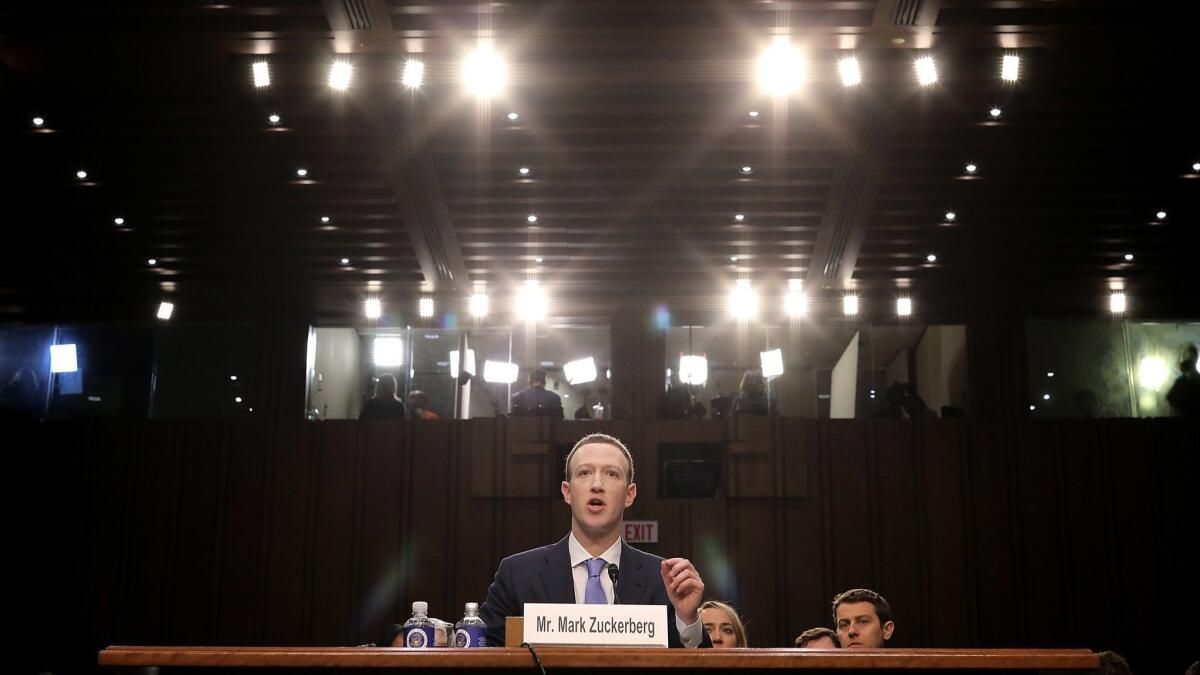Facebook CEO Mark Zuckerberg shows support for the idea of regulation — but not the particulars

- Share via
During historic testimony Tuesday on Capitol Hill, Facebook Chief Executive Mark Zuckerberg made sure lawmakers knew his company was working hard to protect user data.
“I’m committed to getting this right,” Zuckerberg told the Senate Commerce, Science and Transportation Committee and the Senate Judiciary Committee.
WATCH LIVE: Day 2 of Facebook chief Mark Zuckerberg’s testimony before Congress »
But when it came to the subject of regulations that would enshrine user protections into law, the tech billionaire’s answers were far more nebulous.
“You embrace regulation?” Sen. Lindsey Graham (R-SC) asked pointedly.
“I think the real question, as the internet becomes more important in people’s lives, is what is the right regulation, not whether there should be or not,” Zuckerberg replied.
It was a telling moment that underscored the difficult balancing act Facebook is trying to execute.
Chastened by more than a year of controversies that included Russian meddling, the spread of misinformation and data misappropriation, Zuckerberg had to appear sufficiently contrite and cooperative before the senators, experts say. But he also had to steer them away from the idea of stringent oversight.
Zuckerberg’s strategy required threading a needle — saying he supported regulations in principle, while pointing to a host of changes made by the company in recent weeks to win back consumer trust and get ahead of the controversy.
“If you fear regulation that you can’t live with, you try to sit on the same side of the table as the regulators and help them ‘get it right,’ where getting it right means getting it so you can live with it,” said Erik Gordon, a professor at the University of Michigan’s Ross School of Business.
“If he acts as if he is going to wrestle with the regulators, they won’t invite him to the room where they cook up their regulations,” Gordon continued. “If he acts cooperative, he might get an invitation and a seat at the table.”
Holding that line will be tenuous. Any stated support by Zuckerberg for regulation risks being undermined by the company’s lobbying efforts to block enhanced privacy protections in California and possibly Illinois, where industry is resisting a biometic privacy law.
Hanging over the company too are new European Union rules that broadly limit how much personal data firms such as Facebook can access.
Zuckerberg’s comments suggest he is receptive to rules that don’t challenge Facebook’s core business, which requires leveraging personal information from a quarter of the world’s population in exchange for billions of dollars in advertising revenue.
As controversy mounted after the company was revealed to have mishandled user data in the Cambridge Analytica scandal, Zuckerberg offered support for the Honest Ads Act, a bipartisan proposal to make online political advertising subject to the same disclosure and transparency rules placed on political ads in TV and print media.
When Sen. Amy Klobuchar (D-Minn.) asked Zuckerberg if he would support a law that requires companies such as Facebook to notify users about data breaches within 72 hours, the executive said, “That makes sense to me.”
In a best-case scenario for Facebook, such small gestures of support and moves to self-regulate will placate lawmakers enough to hold back strict regulation. Zuckerberg repeatedly volunteered to have his staff work with senators on matters of regulation.
That approach would require restraint from some lawmakers, especially those whose constituencies view Facebook as beholden to shareholders rather than privacy, security and the nation’s democratic system.
“Congressional politicians are under pressure to hold internet companies accountable for spreading malicious content that harms people,” said Dipayan Ghosh, a fellow at New America and the Harvard Kennedy School and a former privacy and public policy advisor at Facebook. “For some politicians, that’ll mean advocacy for new regulation. For others, it’ll mean using certain rhetoric. It depends on their respective constituencies.”
Working in Facebook’s favor is the balance of power in both houses of Congress. Regulation-averse Republicans still retain control, though signs point to potential changes in the November midterm elections.
During one exchange, Sen. Orrin Hatch (R-Utah) asked Zuckerberg to describe the kind of regulation he would want to see.
“In your view, what sorts of legislative changes would help to solve the problems the Cambridge Analytica story has revealed? And what sorts of legislative changes would not help to solve this issue?” Hatch said.
It was an opportunity to warn the senators that too much regulation could make it harder to compete — and Zuckerberg didn’t miss a beat.
“There’s a balance that’s extremely important to strike here,” Zuckerberg said, cautioning that America could fall behind China in cutting-edge technology like facial recognition software.
“We don’t want to over-regulate where we’re stifling innovation and investment,” Sen. Roger Wicker (R-Miss.) said moments later.
Twitter: @dhpierson
Twitter: @traceylien








